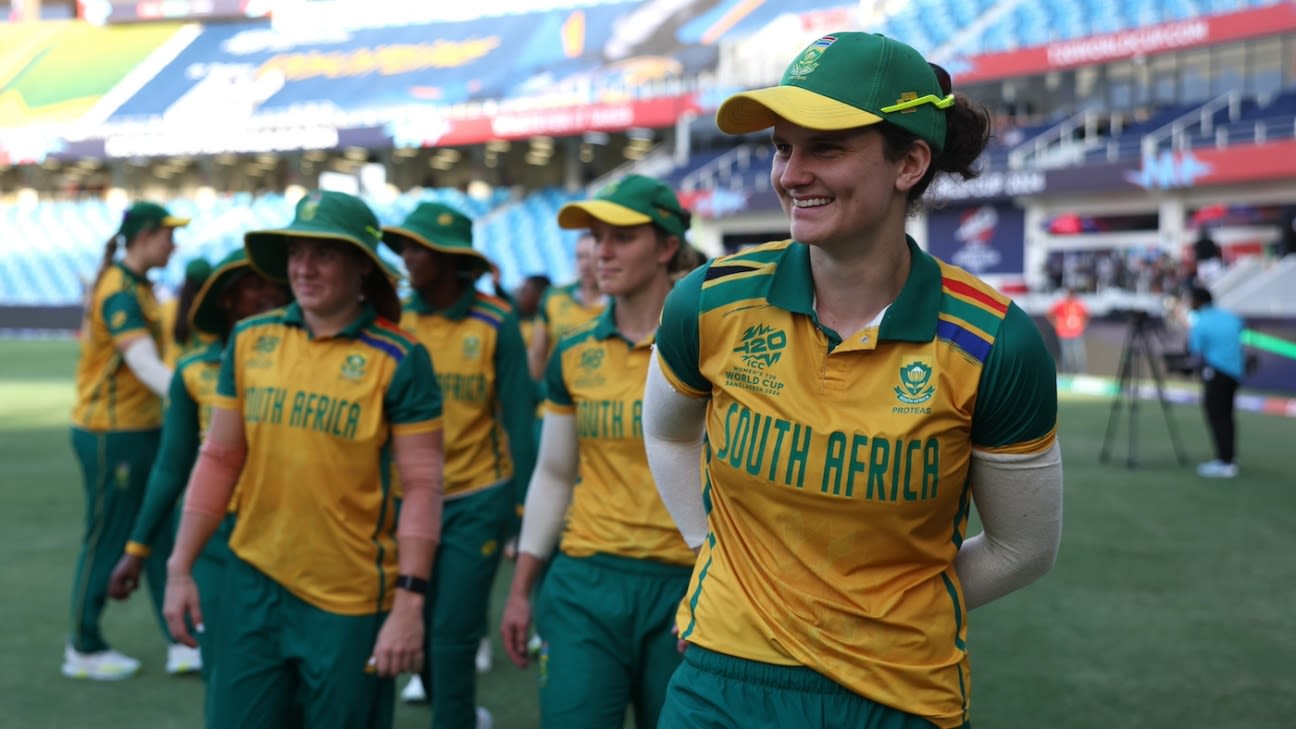Wolvaardt’s charge down the pitch to muscle Olivia Bell down the ground for six in the fourth over was evidence enough as she and Brits thundered their way to 60 without loss, the best powerplay of the tournament so far.
“It’s always tricky games, games like today, but we knew we had to be at our best,” Kapp said after the game. “That has been the message throughout this tournament, that powerplay, to try and be a bit more attacking. Today I think our openers started us off brilliantly.”
Brits’ merciless heave over long-on off Katherine Fraser in the ninth over strengthened South Africa’s case and Kapp went about picking off six boundaries en route a 24-ball 43.
“Looking to the lead-up to this World Cup, she’s not been at her best, and she knows that. Then she gets to the World Cup and somehow finds her best. So it’s good signs for us”
Marizanne Kapp on Nonkululeko Mlaba
De Klerk’s celebration for her second wicket was more controlled, but the dismissal no less spectacular, Mlaba launching herself forward at short third to grasp Abtahah Maqsood’s leading edge and grinning broadly as she lifted her head from the turf, the match won.
Mlaba had set up the victory over West Indies with a career-best 4 for 29 and she now threatens Kapp’s nine wickets in the previous T20 World Cup as leading wicket-taker for South Africa at a single edition of the tournament. Mlaba has eight wickets so far – equal to the retired Shabnim Ismail in 2023 – at an average of 7.87 and economy rate of 5.25.
It follows a difficult time between World Cups for Mlaba, who during that time had only taken 14 wickets from 19 matches at an average of 38.40.
“Looking to the lead-up to this World Cup, she’s not been at her best, and she knows that. Then she gets to the World Cup and somehow finds her best,” Kapp said. “So it’s good signs for us. Hopefully she can continue like that for the next couple of games. But very proud of her to turn things around so quickly.”
Scotland want fixtures against higher-ranked teams
Scotland’s batting card made for sorry reading with only two players reaching double-figures and no one passing Fraser’s 14.
While Chatterji remained upbeat, saying Scotland continued to learn from the experiences, having gone through qualifying to get here, she also highlighted the need for those opportunities to come outside of major tournaments.
“It’s tough but we’re a resilient group and that’s part of cricket, it’s part of high-performance sport,” Chatterji said. “The best teams go away and they learn and they move forward and you take what you can. But for sure, it’s disappointing to lose and it’s always disappointing to lose and a heavy defeat like that isn’t much fun, but I thought they played very well.
“The main thing is we want to play these teams more often. I think South Africa is the highest-ranked team we’ve ever played, so it would be awesome to get some fixtures lined up against the higher-ranked teams and if we can get these back-to-back fixtures, we’ll learn and develop a lot and progress for sure.”
Scotland are still a semi-professional team and when comparing their set-up to those of South Africa and Australia, whose resources blow South Africa’s out of the water, the disparity is stark.
“There’s quite a few gaps,” Chatterji said. “It’s pretty hard being an Associate country and I guess it’s a double-whammy being an Associate and a women’s team. That being said, if you look at the overall budgets between the different countries it’s very, very different especially comparing between Associate and Full-Member nations, so we do what we can.
“But when we’re away, we don’t make any excuses. There’s really important conversations to be had about overall structures, fixtures and how there can be more support from, whether it’s the governing bodies or the ICC, and how you make that happen to grow the game. But again, the biggest thing for us is just we need to play more and probably more at a higher level.”
Valkerie Baynes is a general editor, women’s cricket, at ESPNcricinfo


